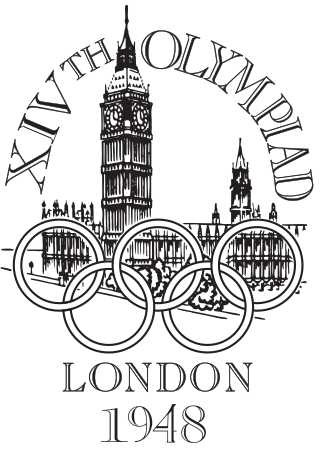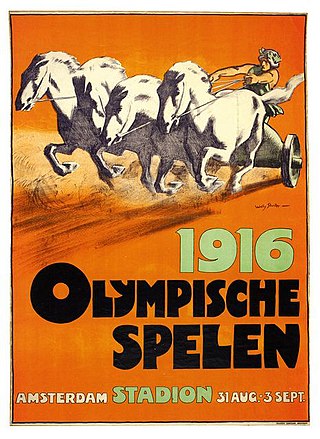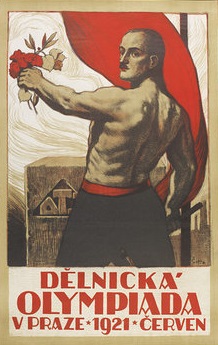Related Research Articles

The Summer Olympic Games, also known as the Games of the Olympiad, and often referred to as the Summer Olympics, is a major international multi-sport event normally held once every four years. The inaugural Games took place in 1896 in Athens, Greece, and the most recent edition was held in 2021 in Tokyo, Japan. The International Olympic Committee (IOC) is responsible for organising the Games and for overseeing the host city's preparations. The tradition of awarding medals began in 1904; in each Olympic event, gold medals are awarded for first place, silver medals for second place, and bronze medals for third place. The Winter Olympic Games were created out of the success of the Summer Olympic Games, which are regarded as the largest and most prestigious multi-sport international event in the world.

The 1948 Summer Olympics were an international multi-sport event held from 29 July to 14 August 1948 in London, England, United Kingdom. Following a twelve-year hiatus caused by the outbreak of World War II, these were the first Summer Olympics held since the 1936 Games in Berlin. The 1940 Olympic Games had been scheduled for Tokyo and then for Helsinki, while the 1944 Olympic Games had been provisionally planned for London. This was the second time London had hosted the Olympic Games, having previously hosted them in 1908, forty years earlier. The Olympics would again return to London 64 years later in 2012, making London the first city to have hosted the games three times, and the only such city until Paris and Los Angeles host their third games in 2024 and 2028, respectively. The 1948 Olympic Games were also the first of two summer Games held under the IOC presidency of Sigfrid Edström.

The 1952 Summer Olympics, officially known as the Games of the XV Olympiad and commonly known as Helsinki 1952, were an international multi-sport event held from 19 July to 3 August 1952 in Helsinki, Finland.

The 1920 Summer Olympics, officially known as the Games of the VII Olympiad and commonly known as Antwerp 1920, were an international multi-sport event held in 1920 in Antwerp, Belgium.

The 1940 Summer Olympics, officially known as the Games of the XII Olympiad, were originally scheduled to be held from September 21 to October 6, 1940, in Tokyo City, Empire of Japan. They were rescheduled for Helsinki, Finland, to be held from July 20 to August 4, 1940, due to the 1937 Japanese invasion of China, but were cancelled because of World War II. Helsinki eventually hosted the 1952 Summer Olympics, while Tokyo later hosted the 1964 and 2020 Summer Olympics, the latter being postponed to 2021 due to the COVID-19 pandemic.
The 1944 Summer Olympics, which were to be officially known as the Games of the XIII Olympiad, were cancelled because of World War II. They would have been held in London, England, United Kingdom, which won the bid on the first ballot in a June 1939 IOC election over Rome, Detroit, Lausanne, Athens, Budapest, Helsinki and Montreal. The selection was made at the 38th IOC Session in London in 1939.

The 1916 Summer Olympics, officially known as the Games of the VI Olympiad, were scheduled to be held in Berlin, German Empire, but were eventually cancelled for the first time in its 20-year history due to the outbreak of World War I. Berlin was selected as the host city during the 14th IOC Session in Stockholm on 4 July 1912, defeating bids from Alexandria, Amsterdam, Brussels, Budapest and Cleveland. After the 1916 Games were cancelled, Berlin would eventually host the 1936 Summer Olympics, twenty years later.

The Helsinki Olympic Stadium, located in the Töölö district about 2.3 kilometres (1.4 mi) from the centre of the Finnish capital Helsinki, is the largest stadium in the country, nowadays mainly used for hosting sports events and big concerts. The stadium is best known for being the centre of activities in the 1952 Summer Olympics. During those games, it hosted athletics, equestrian show jumping, and the football finals.

The Finnish Workers' Sports Federation is a Finnish amateur sports organization founded in 1919. In addition to the competitive sports, TUL focuses on youth activities and youth education as well as offering activities regardless of age, gender, ethnicity or financial means. TUL is one of the member associations of the Finnish Olympic Committee.

National Olympic Committees that wish to host an Olympic Games select cities within their territories to put forth bids for the Olympic Games. The staging of the Paralympic Games is automatically included in the bid. Since the creation of the International Olympic Committee (IOC) in 1894, which successfully appropriated the name of the Ancient Greek Olympics to create a modern sporting event, interested cities have rivaled for selection as host of the Summer or Winter Olympic Games. 51 different cities have been chosen to host the modern Olympics: three in Eastern Europe, five in East Asia, one in South America, three in Oceania, nine in North America and the remainder in Western Europe. No Central American, African, Central Asian, Middle Eastern, South Asian, or Southeast Asian city has ever been chosen to host an Olympics.

Helsinki has a long tradition of sports, the city gained much of its initial international recognition during the 1952 Summer Olympics, and the city has since then been very open to arranging sporting events. The Olympic Stadium is also home to the Sports Museum of Finland. Helsinki hosts fairly successful local teams in both of the most popular team-sports in Finland, football and ice hockey. The later being a sport of passion for many Helsinkians, who usually take a stance for either of the local clubs HIFK or Jokerit. The strong culture of ice hockey has led to Helsinki becoming the birthplace of many legendary National Hockey League stars such as Teemu Selänne, Jari Kurri and Esa Tikkanen.

Helsinki Swimming Stadium is an outdoor swimming venue in Helsinki, Finland, located in the Eläintarha area to the northeast of the Helsinki Olympic Stadium.

Socialist Workers' Sport International was an international socialist sporting organisation, based in Lucerne. It was founded in 1920, and consisted of six national federations at the time of its foundation. Initially it was known as International Association for Sports and Physical Culture. Informally it was known as the Lucerne Sport International. It adopted the name SASI in 1926. The Austro-Marxist Julius Deutsch was the president of SASI.

Helsinki Velodrome is an outdoor velodrome, American football and field hockey stadium in Helsinki, Finland. The protected functionalist concrete building was designed by Hilding Ekelund.
For the 1952 Summer Olympics, a total of twenty-four sports venues were used. Three of the venues were constructed for the 1940 Summer Olympics, but were postponed in the wake of World War II. Those venues were completed in time for the 1952 Games. The main stadium served as host to the World Athletics Championships in 1983 and in 2005. Two venues were purchased by the city of Helsinki after the Olympics, one changed from an exhibition center to a sports arena, and another changed from a sports arena to an art museum. With an annual average temperature of 5.9 °C, Helsinki is the coldest city to host the Summer Olympics.
International Workers' Olympiads were an international sporting event arranged between 1925 and 1937 by Socialist Workers' Sport International (SASI). It was an organisation supported by social democratic parties and International Federation of Trade Unions. Workers' Olympiads were an alternate event for the Olympic Games. The participants were members of various labor sports associations and came mostly from Europe. Nowadays the CSIT World Sports Games are the successor sports events of the International Workers' Olympiads. The "World Sports Games" is the main highlight and a new brand of the International Workers and Amateurs in Sports Confederation (CSIT). It is a sports event for thousands of workers and amateurs held every two years. The CSIT is an international multi-sports organization.

The 1937 Workers' Summer Olympiad was the sixth edition of International Workers' Olympiads. The games were held from 25 July to 1 August at Antwerp in Belgium. They were originally planned for Barcelona 1936, but cancelled due to the outbreak of the Spanish Civil War.

Finnish Workers' Sports Federation football team was an association football team representing the Finnish Workers' Sports Federation (TUL) in 1921–1950. At the time, the sport in Finland was divided as the leftist TUL was isolated from the right-wing sports movement. In football, the TUL clubs and the Finnish Football Association (SPL) clubs competed in their own championship series and the Finnish national football team was selected of the SPL players only. The TUL football team participated the International Workers' Olympiads in 1925, 1931 and 1937 and the Moscow Spartakiad in 1928.

1921 Workers' Olympiad was the first unofficial edition of the International Workers' Olympiads, organized by the 1920 established Lucerne Sport International and hosted by the Czechoslovakian Workers' Gymnastic Association in Prague, Czechoslovakia. The original scheduled date was August, but finally the games were held from 25 June to 29 June 1921. The first official Workers' Olympiads were held in 1925 in Schreiberhau (Winter) and Frankfurt am Main (Summer) in Germany. The unofficial Czechoslovakian games were staged again in 1927 and 1934.
References
- ↑ Labour Olympiads International Institute of Social History. Retrieved 23 May 2015.
- 1 2 "Punaiset olympialaiset (audio)" (in Finnish). Yle Radio 1. 25 June 2012. Retrieved 23 May 2015.
- ↑ TUL JA PONNISTUS 1930 -LUVULLA Archived 2016-03-04 at the Wayback Machine (in Finnish). Helsingin Ponnistus. Retrieved 23 May 2015.